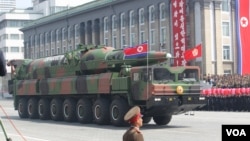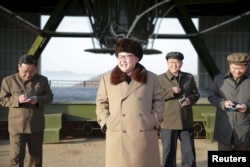Unnamed U.S. officials on Thursday said North Korea may be preparing for an intercontinental ballistic missile test launch after South Korean media reported movement of what could be components of an upgraded ICBM, less than two days before the inauguration of President-elect Donald Trump.
The sighting of objects believed to be the lower half of an ICBM at North Korea's main missile launching site was reported by South Korean media Wednesday.
The U.S. officials, who spoke on condition of anonymity, said the United States was seeing activity in North Korea indicating a possible ballistic missile test, including positioning of two mobile missile launchers, according to Reuters.
A mobile ICBM would be difficult to detect until fired. Still, the timing of the test and precise type of missile is not clear, the officials said.
Trump's first test?
The timing of a possible new missile continues Pyongyang's practice of testing new U.S. administrations. U.S. experts cautioned that any missile test during the inaugural celebrations could backfire as Trump's position toward North Korea remains unclear.
The Pentagon declined comment on its intelligence about the North Korea threat, but spokesman Peter Cook assured reporters that Washington's readiness would be not be diminished during the U.S. presidential transition, due to take place on Friday.
“We would once again encourage North Korea not to engage in provocative actions that do nothing but destabilize the region,” he said.
South Korea maintains 'readiness posture'
Also Thursday, Roh Jae-cheon, South Korea's defense ministry spokesman, said at a Seoul news conference that the ministry believes “North Korea may be able to launch an ICBM anytime, anywhere, if the leadership decides to do so, and thereby we are currently maintaining the military readiness posture.”
Kim Dong-yeop, a researcher at Kyungnam University's Institute for Far Eastern Studies in Changwon, South Korea told VOA Korean Service's Han Sangmi on Thursday that the South Korean and U.S. governments believe North Korea has built two new prototypes of intercontinental ballistic missile.
"The KN-08 and KN-14 [missiles] were revealed during parades in 2013 and 2015, respectively, but my understanding is that there is none that is 20 meters in length and is ready to be launched," said Kim. By using one of these Musudan-type missiles and replacing its engine with a new ICBM engine, the North is attempting to test a missile that looks like an older model but is actually an ICBM, he said.
Experts are 'puzzled'
On Thursday, Bruce Klingner, a senior research fellow with The Heritage Foundation's Asian Studies Center in Washington, D.C., told VOA he had spoken with missile experts who “are puzzled over the description that it's shorter than either of the road mobile ICBM variants, KN-08 and KN-14. So we don't know if it's yet another variant or whether it's perhaps misidentification of intermediate range or shorter range missile.”
Bruce Bennett, senior defense analyst at the Rand Corporation in Santa Monica, California, said to VOA that “North Korea has been very careful” with the prospect of the Trump administration.
“They have to ask if they are better confronting the Trump administration or if they are better being conciliatory and we don't know what their conclusion on this is," he said. "If they do a test, it would suggest they've decided to be confrontational, and that may not be good for North Korea.”
Sanctions an option
Bennett added that “The U.S. government could try to develop even more powerful sanctions against North Korea. The problem with sanctions is they tend to be based on trade, and most of North Korea's trade is with China and China is not particularly anxious to increase the sanctions.”
However, Klinger said, “It's a certainty that North Korea will do additional nuclear and long range missile tests. They vowed to do so. But there's always an uncertainty about when and why North Korea does the testing.”
The reports of the new ICBM came after North Korean leader Kim Jong Un suggested on New Year's Day that North Korea may soon test an intercontinental ballistic missile (ICBM) capable of reaching the U.S. mainland.
Last week, U.S. experts dismissed the remarks as a stunt to intimidate the incoming administration of President-elect Donald Trump, who tweeted “It won't happen.”
Test launch expected in 2017
On January 8, the North's state-run news agency, KCNA, reported that the country can launch an ICBM “anytime and anywhere,” reiterating the position that the communist state is bolstering nuclear arms capabilities for “self-defense” against the U.S.
Ambassador Joseph DeTrani, former U.S. special envoy for negotiations with North Korea, however, told VOA that test launching an ICBM, “is a real possibility in 2017,” DeTrani said. “It's a threat to the region and to the United States also, given the fact that it could deliver a nuclear weapon.”
Recently, the U.S. has been increasing pressure on North Korea in coordination with South Korea and Japan. The hope is to disarm the North and bring it back to the Six-Party talks initiated in 2003. The talks involved China, Japan, Russia, South Korea, the U.S., and North Korea.
U.S. would rather resume talks
North Korea is believed to have the ability to strike South Korea and Japan with a nuclear weapon. But questions remain over Pyongyang's ability to reach the U.S. mainland.
The U.S. State Department said last week that Washington continues to hope that talks, which have been stalled since late 2008, are “a mechanism that could potentially bring” Pyongyang back into discussions about its nuclear weapons program.
Pyongyang has long urged Washington to accept the country as a nuclear state, abandon the strategic alliance with South Korea, and pull U.S. troops out of the Western Pacific region.









